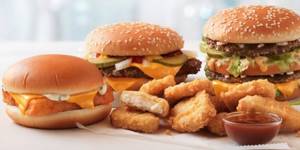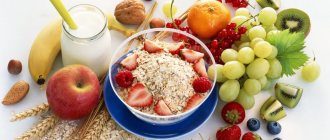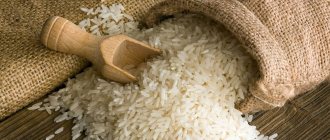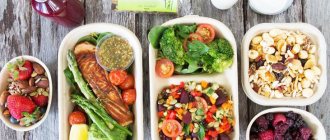In the summer, I switched to working night shifts because of the double pay bonus. Who would throw money around these days? Out of habit, I practiced random snacks and large amounts of coffee. It was difficult to “train” the body, because it is customary to sleep at night. In order not to fall off your feet, you had to drink caffeinated drinks and treat yourself to sweets and cakes as compensation for the suffering.
But this diet had a negative impact on my well-being. And the weight gain was not long in coming. Then I began to look for useful information for myself and came across the advice of nutritionist Vaida Kurpiene.
What is an overnight diet?
A special nutritional system was developed in the mid-twentieth century by the American psychiatrist Albert Stankard.
This specialist studied the phenomenon of night gluttony and tried to find a solution to this problem, which is relevant for many people. He believed that people who eat little during the day and consume most of their calories at night have low self-esteem. In addition to this there are metabolic disorders, excess weight and dependence on sweets and starchy foods. Psychological problems disrupt sleep patterns and affect the nutritional system. According to Stankard, nighttime gluttony is the result of sudden hormonal changes, and not a lack of willpower. In people suffering from this, the levels of melatonin (the sleep hormone) and leptin (the substance responsible for the feeling of fullness) sharply decrease after dark, although they should increase. The psychiatrist suggested correcting the problem with a diet at night and personally developed one.
The nutrition system is designed for those who suffer from insatiability at a time when they need to sleep soundly. It is also suitable for people who are forced to undergo physical activity at night, working in shifts, because many are just starting their working career when it gets dark. You can follow a night diet for both overweight people and those who just want to learn how to eat healthy.
Where do the roots come from?
Where the roots grow from
Regardless of what type of biorhythm the body belongs to (“owl”, “lark” or “dove”), the general trends in the work of all systems and organs are the same: during the day - intensive work, at night - recovery. And violation of this principle leads to dangerous consequences.
Firstly, night owls usually experience a decrease in the level of the happiness hormone in the blood; they often feel depressed, apathetic, and are susceptible to depression and mood swings. What do we do when we are sad? That's right - we go to the Great White Friend (that is, to the refrigerator) and scoop out everything tasty from there. Not only is this harmful in itself, but the body also does not have time to process this yummy food (after all, we usually eat at night, too). The result (aka excess weight) is obvious. As well as other protruding and not so protruding parts of the body.
In addition, working at night is a lot of stress for the body (it, being naive, is used to sleeping at night), and if you load it with food, the stress will become double. So problems with the gastrointestinal tract and excretory system are not so illusory.
Peculiarities
The night diet is considered healthy and is suitable for both those who are overweight and those who simply want to develop the right eating habits and normalize their rest regime. The kilograms will go away slowly, but will not come back. Based on what diet you choose, strict or not, you can lose 2-6 extra kg in a month of diet. The advantage is that there are no food restrictions or hunger strikes . Psychologically, dieting is easy.

He who works at night eats!
Forget that eating at night is prohibited. With any activity at this time of day, mental or physical, the body needs energy. Depriving the body of fuel and increasing the already high stress load means putting the body in the “store calories, store fat” mode.
Fasting while being active is a direct path to obesity and the development of serious metabolic pathologies.
Another thing is what foods to treat yourself to after sunset? You will have to categorically give up all fast carbohydrates: at this time of day, all processes are slowed down and any dessert will settle on your sides and waist.
Keep a carbohydrate chart handy and do not include foods whose glycemic index exceeds 50-60 units in your diet.
Rules
The overnight diet is a complex nutrition system, the organization of which must be approached responsibly in order to ensure results. It must be observed by following these principles:
- The main thing with this diet is to eat right during the day. Food should be consumed in fractions. The volume of each serving on the diet does not exceed 200 g. The interval between meals is 2-3 hours. The only exception is breakfast, which should be as dense as possible.
- It is necessary to select foods for the diet that are high in fiber and protein and low in carbohydrates. Eggs, cottage cheese, chicken or turkey, cheese, and fresh vegetable salads will be digested well in the morning. You can add dried fruits, nuts, bananas to the dish. The closer the night, the lighter the food should be. Anything low in calories will do. Three hours before bedtime according to the diet regimen - only a glass of kefir.
- Fractional meals and a diet of foods containing fiber and protein, as suggested by the diet, will help restore the natural production of hormones according to natural biorhythms. By night, the levels of melatonin and serotonin are normalized, so the person will want to sleep.
- In case of awakenings, keep a non-carbonated mineral water, fruit drink or tea with a small amount of sugar by your bed. If you feel like eating, drink. The liquid will fill your stomach and help you last until breakfast. Gradually, night awakenings from hunger will occur less and less often.
- The overnight diet must be followed for at least six months. During this period, you will get used to eating right.
Night owl mode

Everything is a little different here. How to eat properly if you work at night is easier for owls to understand, because they are night owls by nature. But there is a danger here: the brutal appetite also wakes up at night, but it still needs to be moderated (otherwise fat “pillows” on the thighs cannot be avoided). Therefore, the approximate diet for “owls” is as follows.
First meal (16-18 hours): hearty food - meat, fish, legumes, side dishes, in general, everything your heart desires (without excesses, of course).
Healthy foods
The nightly nutrition system involves a varied diet, so people who follow it do not have difficulties in creating a menu. The list of foods allowed during the diet includes:
- Lean fish, meat. Diet foods need to be boiled, baked or steamed. They will provide protein and will not overload the pancreas and liver.
- Eggs. They can be hard-boiled, soft-boiled, or made into an omelette.
- Pasta, cereals. Buckwheat, brown rice, and durum wheat pasta are suitable for the diet.
- Vegetables. Stewed dishes, boiled dishes, and salads are suitable.
- Dairy products, cheeses, dried fruits. An excellent choice for snacking on a diet.
- Tea. It is advisable to switch to green and not add sugar.
- Chocolate, coffee. In minimal quantities these are excellent brain stimulants.
Sleep for those who work at night: when, how, how much?
During sleep, the body produces an extremely important hormone - melatonin. Its deficiency leads to the development of depression and weight gain.
Unfortunately, sleeping during the day is not the best way to provide your body with rest. And yet, you need to take this event quite seriously: after an active night, the body requires rest and should get it.
Recommendations for daytime rest:
- Take a shower or warm bath.
- Ventilate the sleeping area.
- Curtain the windows and make the bed (do not fall asleep exhausted, half-sitting in a chair, without undressing).
- For a comfortable sleep, you can use a blindfold and earplugs.
- Sleep duration is at least 8 hours.
If after waking up you quickly become active, cheerful and positive, then your nap was a success. Feeling unwell and depressed mood indicate lack of sleep, the chronic form of which will lead to illness, weight gain and deterioration in appearance.
Night mode should not become an excuse for a permissive attitude towards oneself. If your job is traumatic for your health, it’s time to think about changing it. Don't become a victim of circumstances. Be the master of opportunity.
What to give up
The diet for those who work at night involves a large list of prohibited harmful foods. Their use should be categorically avoided. The following products are prohibited:
- cakes;
- pies;
- cookie;
- cakes;
- buns;
- baked goods made from white flour;
- semi-finished meat products;
- fast food;
- alcohol (except for dry red wine);
- junk food;
- fruits high in sugar (tangerines, melons, mangoes, grapes);
- sweet carbonated drinks.

Nutrition rules for early risers
Such people need to realize that their peak activity and work of the internal systems of the body will always occur in the morning and the first half of the day. It is unusual for them to work in shifts, because by the evening sleep and fatigue begin to overcome them.
Menu option for early risers:
- 16–18 hours – broth, meat/fish with side dish. This meal should be nutritious, but not contain foods that are too fatty or heavy for the stomach.
- 20–22 hours – vegetable salad or dairy products with low fat content (milk, kefir, cottage cheese, soft cheese). After it, during the entire night shift, you can drink water or herbal tea and snack on whole grain bread.
- 7–8 hours is the most dense meal of the day. Focus on cereals, protein products (meat, fish, beans), various fruits and desserts are acceptable.
It is advised not to overuse coffee throughout the night - excessive consumption of caffeine can only harm the stomach. A similar recommendation applies to energy drinks: due to gas, a large amount of sugars and flavorings, they cause even more harm to the body than strong espresso.
Diet menu
There are many diet options, so you won’t have to suffer from the monotony of food. When composing a menu for a night diet, you need to focus primarily on daily calorie content. The time you choose for breakfast, lunch and dinner plays a secondary role. Diet options for those who don’t know how to lose weight if you work at night:
| Menu 1 | Menu 2 | |
| Night | Buckwheat porridge with stewed vegetables (100 g), boiled meat (80 g), a slice of rye bread with cheese (25 g), hot green tea. | Boiled rice (100 g), vegetable stew (150 g), baked salmon (180 g), a glass of fruit juice. |
| Day | Boiled chicken breast (200 g), 2 hard-boiled eggs, 2 cups of kefir. | Steamed turkey (180 g), 150 g of cottage cheese with dried fruits (dried apricots, figs, prunes), a glass of kefir. |
If you plan to sleep at night, but are not used to going to bed on an empty stomach, you need a different diet. Dinner can be at any time, but should consist only of healthy foods . Diet options before bed:
- 200 g of cottage cheese with fruits or dried fruits.
- Steam omelette made from two eggs and champignons.
- 200 g of baked fish, fresh vegetable salad.
- 200 g of seafood, stewed with vegetable oil, sprinkled with grated cheese.
If during the day you have lost your temper and violated the daily calorie rule, then dinner can be replaced with a healthy snack. The following products are suitable for this:
- A glass of kefir. It will fill your stomach and give you a feeling of fullness, which is enough to fall asleep.
- Banana. Promotes the production of melanin and serotonin, saturates.
- Warm milk with a teaspoon of honey. Saturates, soothes, relieves tension.
- A couple of apples. Removes toxins and gives energy.
- Herbal tea with honey and rye bread. Calms.
- 30 g nuts. Relieves tension and satisfies hunger well.

An alternative diet for the night was proposed by an American, Dr. Caroline Eprovian. According to her method, you need to fast one day a week, drinking only three glasses of fruit or vegetable juice throughout the day. For the next 6 days you should eat, making up your diet based on the following recommendations:
- Every day you need to eat the amount of protein corresponding to your growth. (less than 165 cm - 350 g and adding 25 g for every 5 cm of height).
- Fruits can be eaten in any quantity.
- You should include the maximum amount of non-starchy vegetables in your diet. Broccoli, carrots, onions, white and cauliflower, tomatoes, spinach, cucumber, and sweet peppers are suitable. Potatoes are excluded.
- You can drink 2 glasses of milk (low-fat) or eat a little light cheese per day.
- You can eat 1-2 servings of some porridge with water as a side dish.
- From fats, 1 tsp can be added to dishes 4 times a day. olive oil, avocado, seeds, nuts or low-fat sour cream.
- Be sure to drink 8 glasses of water a day. In addition, unsweetened tea, coffee, and herbal infusions are allowed.
What to eat at night? Options for late dinner and snacks

Researchers at the University of Colorado at Boulder conducted an interesting experiment. They gathered a group of 14 adults who slept at night and were awake during the day for two days, after which they changed their routine - and for the next 4 days they slept during the day and were awake at night.
The study found that with the same diet and physical activity, staying awake at night leads to a slowdown in metabolism. Participants in the experiment, working at night, burned 52-59 kcal less than when working during the day. According to scientists, the culprit is a disruption of circadian rhythms, which has a great impact on metabolism. “If you often have to work at night, reduce your daily caloric intake by 50-60 kcal, this will be an excellent prevention of weight gain,” the scientists conclude.
What foods are best for satisfying hunger during night shifts?
Seafood, fish, lean meat, cottage cheese, eggs
Baked, stewed or boiled foods will provide the body with complete protein, which perfectly saturates, but does not overload the pancreas and liver with excess fats. Good options are stewed vegetables and boiled chicken breast, cottage cheese dessert (unsweetened, without fillers), an omelet made from a couple of eggs, a slice of fish.
Fresh and stewed vegetables
An excellent nightly side dish is vegetable stew. It contains enough vitamins and nutrients to keep you full, but at the same time, a small amount of calories, which is important for night shifts. As an alternative to stewed vegetable dishes, salads from fresh vegetables can be used. Important: dressing them with mayonnaise and fatty sauces is strictly prohibited! It is better to sprinkle the dish with lemon juice or add a spoonful of vegetable oil.









